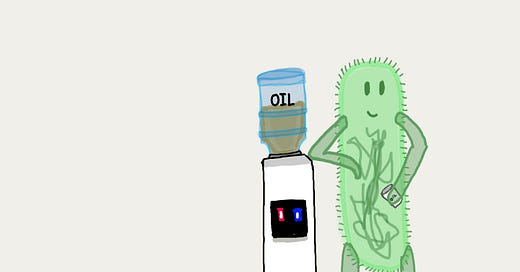When people hear synthetic biology, often the first things that come to their minds are GMOs and probiotics. These applications, though important, do not show the full capability of synthetic biology. Synthetic biology is not limited to just foods and medicines -- it can also be used to save the environment from deadly oil spills!
Oil spills are disastrous to the aquatic environment. Spilled oil would coat the bodies of aquatic animals and kill them by poisoning or suffocation. Even if the animal survives, the oil will cause its fur to lose its insulating effects as well as its buoyancy. Furthermore, the fumes from spilled oil can be harmful to the lungs, eyes, and brains of animals.
Not only are oil spills catastrophic to the environment, but they are also extremely difficult to clean up. Oil does not mix with water, so it forms a thin film above the water. This causes oil spills to spread much farther, making spill clean-up efforts long and tedious. On top of that, oil begins to mix with water after a while and takes on a consistency similar to pudding; making oil spills that are not immediately cleaned up more expensive and time-consuming to clean up.
Faced with such a tall challenge, synthetic biology responds with an even more impressive solution: oil-eating “jellyfish.” Dr. Nina Pollak’s team at the University of the Sunshine Coast in Australia is currently working on creating a multicellular structure that can detect toxins in the aquatic environment. Once developed, these “jellyfish” could be deployed to spill sites as a non-invasive method to clean up the spill.
Other researchers like Dr. Tatyana Chernikova at Bangor University in Wales are working on increasing the efficiency of marine bacteria which can already degrade the oil.
Synthetic biology offers a multitude of unique and possible solutions to oil spills, perfectly exemplifying how versatile synthetic biology is.
Sources
https://blog.csiro.au/how-synthetic-jellyfish-could-be-used-to-clean-up-toxic-marine-spills/
Can oil-eating bacteria clean up our seas? | Microbiology Society





